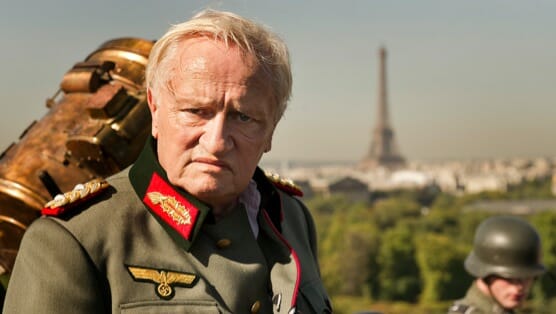Diplomacy

If Hitler had his way in August 1944, Paris would have burned. During the waning days of the German occupation, the city’s bridges and most precious monuments were targeted for destruction with explosives. Hitler’s orders to General Dietrich von Choltitz, the acting military governor, were clear: leave Paris in rubble. For whatever reason, von Choltitz chose to ignore his führer’s command, instead surrendering a largely intact city on August 25. Volker Schlöndorff’s latest feature film, Diplomacy, is a fictional all-night tête-à-tête between the general (Niels Arestrup) and Swedish diplomat Raoul Nordling (André Dussollier) as they wrestle for the future of the city, and their legacies.
The interactions between the men were previously explored in the 1966 film Is Paris Burning?, directed by René Clément. With Gert Fröbe as von Choltitz and Orson Welles as Nordling, the two were part of a larger ensemble that involved a more expansive plot; but in Diplomacy, the characters bask in their Rosencrantz and Guildenstern moment as Schlöndorff takes liberties with history.
Cyril Gely adapts his own stage play for the screen with Schlöndorff, and French acting veterans Arestrup and Dussollier reprise their stage roles. Diplomacy’s roots on the stage are evident—much of the action is relegated to the general’s quarters in the Hotel Meurice, across from the Tuileries Garden, and near the Louvre. At the film’s denouement, the Eiffel Tower can also be seen in the distance through the open balcony. All these markers serve as reference points for the men (and the audience) as to exactly what’s at stake. While the outcome of Paris’s fate is not surprising, the powerful performances by Dussollier and Arestrup convey the magnitude of this imagined moment. Diplomacy is unexpectedly fraught with emotion and anxiety—without histrionics.
-

-

-

-

- Curated Home Page Articles By Test Admin October 21, 2025 | 3:10pm
-

- Curated Home Page Articles By Test Admin October 21, 2025 | 2:57pm
- Urls By Test Admin October 21, 2025 | 2:57pm
- Curated Home Page Articles By Test Admin October 21, 2025 | 2:55pm
-

-

-

-

-

-

-

-

-

-

-

-

-

-

-

-

-

-

-

-

-

-

-

-

-

-

-

-

-

-

-




































